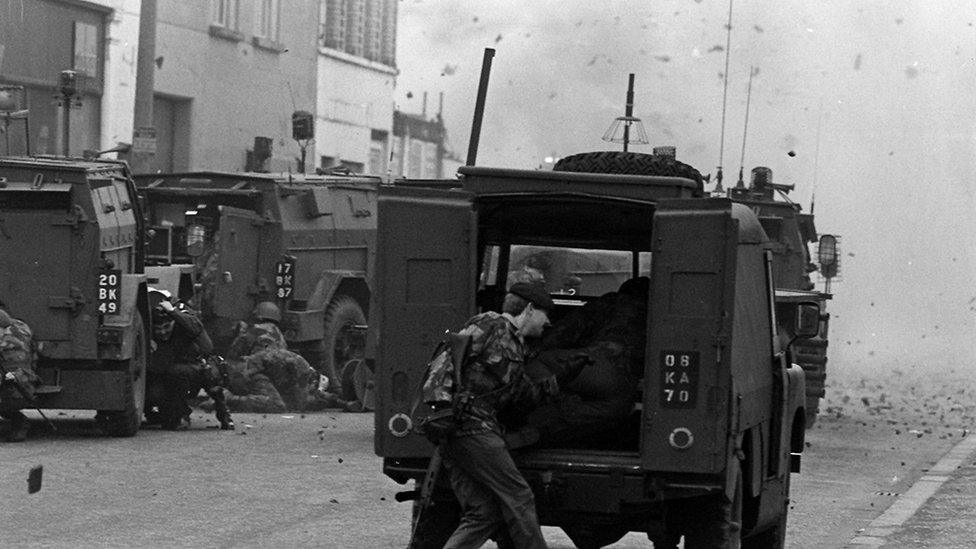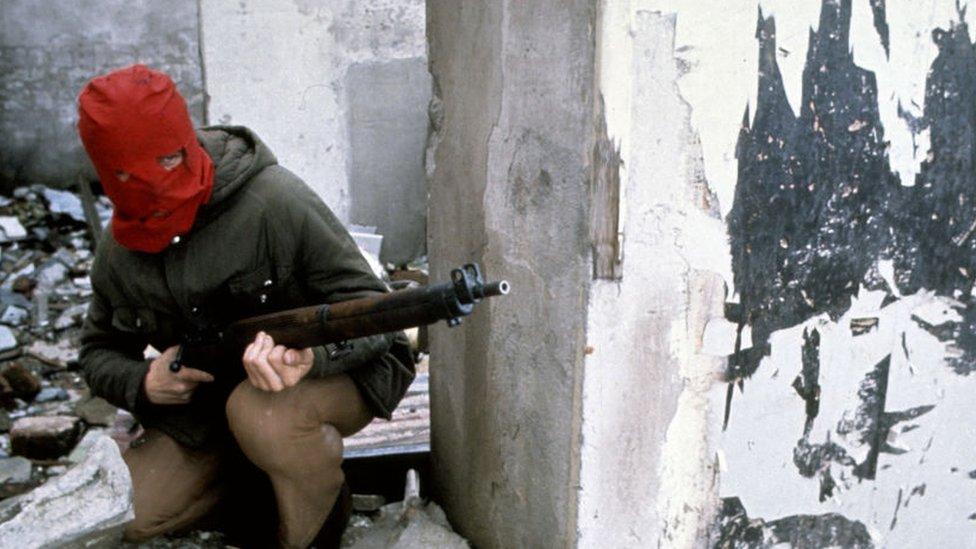NI Troubles: UN experts call for Troubles bill to be withdrawn
- Published

The UK government should consider withdrawing its controversial legacy bill, experts for the United Nation's (UN) Human Rights Council have said.
The legacy bill offers a conditional amnesty to those accused of killings and other Troubles-related crimes.
The officials said the bill "fails to comply with the state's obligation to investigate serious human rights violations" during the Troubles.
They claimed the legacy bill "denies truth and remedy for victims".
The comments from Fabián Salvioli and Morris Tidball-Binz, who are part of a body of independent experts who assist the Human Rights Council, comes one week after the human rights commissioner for the Council of Europe similarly called on the government to consider withdrawing the bill.
A report by Dunja Mijatović said the bill should be stopped due to "widespread opposition" and because of fundamental questions around its compatibility with human rights laws.
In response to Ms Mijatović, the Northern Ireland Office said the legislation did not introduce an amnesty and would not remove the prospect of criminal prosecution.
It said conditional immunity would only be granted to individuals who "cooperate fully and truthfully" with a new information recovery body.
The Northern Ireland Troubles (Legacy and Reconciliation) Bill was first introduced to the House of Commons in May and passed its second reading in the House of Lords in late November.

What is the legacy bill?
Legislation that aims to draw a line under the Northern Ireland Troubles by dealing with so-called legacy issues
The Northern Ireland Troubles (Legacy and Reconciliation) Bill runs to almost 100 pages
It was introduced in May in an attempt to deal with more than 1,000 unsolved killings
A central element involves immunity from prosecution for those who co-operate with investigations run by a new information recovery body
Victims' groups and political parties at Stormont are opposed to the bill, arguing it will remove access to justice for victims and their families
Veterans Commissioner Danny Kinahan gave the bill a cautious welcome and it is also supported by the Northern Ireland Veterans Movement
The Bill had its second reading in the Lords on 23 November. The government told peers it would bring forward amendments including "a more robust process" around immunity from prosecution
Lord Caine of the Northern Ireland Office (NIO) said the Independent Commission for Reconciliation and Information Recovery (ICRIR) would be able to conduct criminal investigations
The amendments will next be discussed at committee stage this month

Fabián Salvioli and Morris Tidball-Binz sit on the Special Procedures of the Human Rights Council - the UN describes it as the largest body of independent experts in its human rights system.
Both expressed concerns that the bill would "substantially hamper victims' access to remedy" in court.
"It would further preclude information recovery and reparations for those victims who have for decades struggled to get justice and redress for the harm endured," they said.
They expressed concerns that the bill "bans and, in some cases, unduly restricts Troubles-related criminal investigations".
They claimed that the Independent Commission for Reconciliation and Information Recover (ICRIR), who would be appointed to oversee investigations under the legislation, would be "severely limited by restrictions in its timeframe, scope of work and caseload under its purview".
The UN experts added: "If approved, the bill would thwart victims' right to truth and justice, undermine the country's rule of law, and place the United Kingdom in flagrant contravention of its international human rights obligations."
They also claimed that the bill, if put into law, would "breach the Good Friday Agreement" and "significantly undermine the Troubles-related peace process".
In a statement to BBC News NI, the Northern Ireland Office said the UK government was "determined to deliver better outcomes for those most impacted by the Troubles while helping society to look forward".
It said it was "absolutely committed to constructive engagement with all interested parties on their ongoing concerns and how they might be addressed as the bill continues its passage through Parliament".
Related topics
- Published9 December 2022

- Published24 November 2022

- Published9 November 2022

- Published17 May 2022
